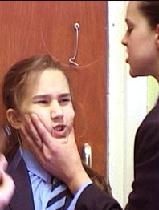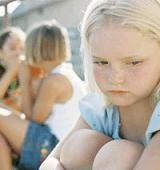Causas y consecuencias del bullying
 Adquiere esta conducta cuando es frecuentemente humillado por los adultos. Se siente superior, ya sea porque cuenta con el apoyo de otros atacantes o porque el acosado es un niño con muy poca capacidad de responder a las agresiones. Familiares: El niño puede tener actitudes agresivas como una forma de expresar su sentir ante un entorno familiar poco afectivo, donde existen situaciones de ausencia de algún padre, divorcio, violencia, abuso o humillación ejercida por los padres y hermanos mayores; tal vez porque es un niño que posiblemente vive bajo constante presión para que tenga éxito en sus actividades o por el contrario es un niño sumamente mimado.Todas estas situaciones pueden generar un comportamiento agresivo en los niños y llevarles a la violencia cuando sean adolescentes. En la escuela: Cuanto más grande es la escuela hay mayor riesgo de que haya acoso escolar, sobre todo si a este factor se le suma la falta de control físico, vigilancia y respeto; humillación, amenazas o la exclusión entre personal docente y alumnos. Por otro lado los nuevos modelos educativos a que son expuestos los niños como la ligereza con que se tratan y ponen en practica los valores , la ausencia de límites y reglas de convivencia, han influenciado para que este tipo de comportamiento se presenten con mayor frecuencia.Consecuencias para el o los agresores  Pueden convertirse posteriormente en delicuentes, la persona se siente frustrada porque se le dificulta la convivencia con los demás niños, cree que ningún esfuerzo que realice vale la pena para crear relaciones positivas con sus compañeros.Consecuencias para la víctimaEvidente baja autoestima, actitudes pasivas, pérdida de interés por los estudios lo que puede llevar a una situación de fracaso escolar, trastornos emocionales, problemas psicosomáticos, depresión, ansiedad, pensamientos suicidas, lamentablemente algunos chicos, para no tener que soportar más esa situación se quitan la vida. Pueden convertirse posteriormente en delicuentes, la persona se siente frustrada porque se le dificulta la convivencia con los demás niños, cree que ningún esfuerzo que realice vale la pena para crear relaciones positivas con sus compañeros.Consecuencias para la víctimaEvidente baja autoestima, actitudes pasivas, pérdida de interés por los estudios lo que puede llevar a una situación de fracaso escolar, trastornos emocionales, problemas psicosomáticos, depresión, ansiedad, pensamientos suicidas, lamentablemente algunos chicos, para no tener que soportar más esa situación se quitan la vida. |
Personales: Un niño que actua de manera agresiva sufre intimidaciones o algún tipo de abuso en la escuela o en la familia.
Adquiere esta conducta cuando es frecuentemente humillado por los adultos.
Se siente superior, ya sea porque cuenta con el apoyo de otros atacantes o porque el acosado es un niño con muy poca capacidad de responder a las agresiones.
Familiares: El niño puede tener actitudes agresivas como una forma de expresar su sentir ante un entorno familiar poco afectivo, donde existen situaciones de ausencia de algún padre, divorcio, violencia, abuso o humillación ejercida por los padres y hermanos mayores; tal vez porque es un niño que posiblemente vive bajo constante presión para que tenga éxito en sus actividades o por el contrario es un niño sumamente mimado.
Todas estas situaciones pueden generar un comportamiento agresivo en los niños y llevarles a la violencia cuando sean adolescentes.
En la escuela: Cuanto más grande es la escuela hay mayor riesgo de que haya acoso escolar, sobre todo si a este factor se le suma la falta de control físico, vigilancia y respeto; humillación, amenazas o la exclusión entre personal docente y alumnos.
Por otro lado los nuevos modelos educativos a que son expuestos los niños como la ligereza con que se tratan y ponen en practica los valores , la ausencia de límites y reglas de convivencia, han influenciado para que este tipo de comportamiento se presenten con mayor frecuencia.
Consecuencias para el o los agresores
Pueden convertirse posteriormente en delicuentes, la persona se siente frustrada porque se le dificulta la convivencia con los demás niños, cree que ningún esfuerzo que realice vale la pena para crear relaciones positivas con sus compañeros.
Consecuencias para la víctima
Evidente baja autoestima, actitudes pasivas, pérdida de interés por los estudios lo que puede llevar a una situación de fracaso escolar, trastornos emocionales, problemas psicosomáticos, depresión, ansiedad, pensamientos suicidas, lamentablemente algunos chicos, para no tener que soportar más esa situación se quitan la vida.